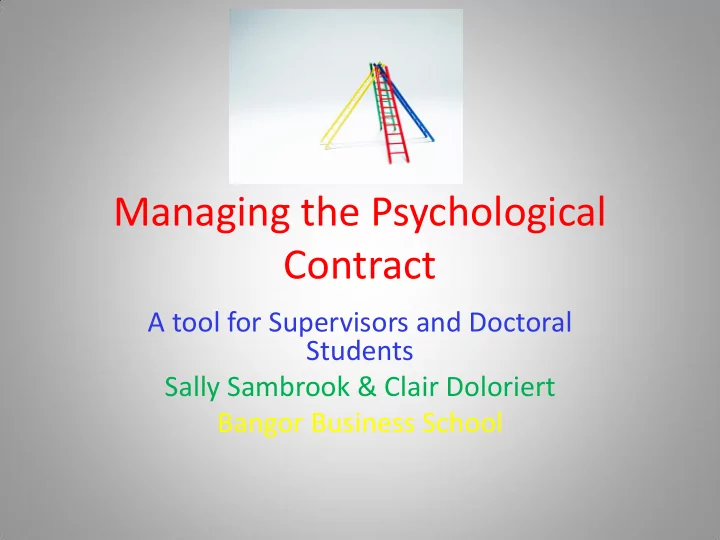

Managing the Psychological Contract A tool for Supervisors and Doctoral Students Sally Sambrook & Clair Doloriert Bangor Business School
Who are we? • Professor Sally Sambrook & Dr Clair Doloriert • We’ve been using & revising our PC forms for a number of years • Our collaborative research between ourselves and others explores various aspects of doctoral supervision and the PC • We hope our toolkit enhances your supervision relationships and we welcome your feedback (see supervisor toolkit).
What is the Psychological Contract? • Argyris (1960 p22) defines the psychological contract as, ‘the perception of both parties to the employment relationship, organisation and individual, of the reciprocal promises and obligations implied in that relationship’.
PC and Doctoral Supervision? • The element of the psychological contract (PC) has been generally neglected in PhD supervision (Wainwright, 2010) • Wade-Benzoni and Rousseau (1998) firmly argue that psychological contracts do exist between supervisors and supervisees in the doctoral process • Iphofen (2001) has proposed a personal contract from supervisor to student. • We offer a reciprocal contract informed by our work and extant literature
How does it work? • Breaches of PC occur when a student perceives that an agent (supervisor, school, university) has failed to fulfil one or more of its obligations comprising the psychological contract. • The emotional ‘fallout’ of a breach is a felt violation which can break down a supervisory relationship. • Our PC forms help ‘out’ implicitly held expectations (of both student and supervisor(s) and manage for possible breaches with obligations. • It enables students and supervisors to discuss violations from an academic perspective, helping all parties take a step back, sometimes, from the emotional side of the perceived breach and work towards a successful resolution.
What do you have to do? • 2 sets of forms – Initial meeting: 1 form for student, 1 for supervisor(s) – Review meetings: 1 form for student, 1 for supervisor(s) • Explain basics of PC to student & invite them to complete Initial meeting form • Supervisors to complete their version of forms, too • All parties meet to discuss, negotiate and agree PC • It is important that all parties have a copy of completed student and supervisor(s) forms • If a felt breach occurs we encourage a review meeting and that the completed forms are used as a platform for discussion • We also recommend annual PC review meetings, where changes to PC can be identified and renegotiated.
Completing the forms – The forms consist of closed and open questions – All questions should be answered – Questions can be adapted to suit individual circumstances – All parties are asked to submit genuine responses rather than trying to second guess ‘ideal’ answers – The forms can be used by more than one supervisor – The forms should take around 15 minutes to complete – Student and supervisor should ensure that the details on the form remain confidential between both parties
Further Reading Doloriert C & Sambrook S (2009) ‘Ethical confessions of the ‘I’ of Autoethnography: the student’s dilemma,’ Journal of Qualitative Research in Organizations and Management, 4 (1), 27-45 Doloriert C, Sambrook S, Stewart J (forthcoming) The power and emotion of doctoral supervision, European Journal of Training and Development Doloriert D & Sambrook S (2011) ‘Accommodating an Autoethnographic PhD: The Tale of the Thesis, the Viva Voce, and the Traditional Business School, Journal of Contemporary Ethnography 40 (5), 582-615 Sambrook S, Doloriert C & Stewart J (2010) Doctoral supervision: Towards a typology of supervisory relationships, 11th International Conference on Human Resource Development Research and Practice across Europe, Pecs, Hungary, 2-4- June Sambrook , S and Wainwright, D (2010) The psychological contract: Who’s contracting with whom? Towards a conceptual model Bangor Business School working papers series BBSWP/10/013 accessed from http://www.bangor.ac.uk/business/docs/BBSWP10013.pdf on April 2012 Sambrook , S., Doloriert, C and Stewart, S (2009a) “Doctoral Supervision: Towards a typology of supervisory relationships” a UFHRF/BMAF study accessed from http://ufhrd.staging.creode.co.uk/wordpress/?p=1909 on April 2012 Sambrook, S., Doloriert, C.H., and Stewart, J. (2009b) ' Innovative Approaches to Supporting Learning and Teaching in HRD presented at the 10th International Conference on Human Resource Development Across Europe, Newcastle Business School, 10th-12th June, 2009 WON ALAN MOON PRIZE BEST PAPER. Sambrook , S., Doloriert, C.H., and Stewart, J. (2009c) “The power and emotion of doctoral supervision – a critical perspective”, presented at the 6th International Critical Management Conference, 13th -15th July, 2009. Sambrook, S., Stewart, J and Roberts, C (2008) Doctoral Supervision: Glimpses from Above, Below and in the Middle, Journal of Further and Higher Education, 32, (1) 71-84
Recommend
More recommend